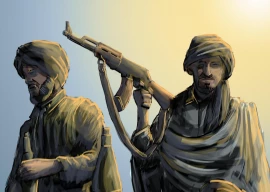Panellists of a conference underscored the importance of enhanced trade and travel between Pakistan and India in improving bilateral relations and reappraisal of the two countries’ role in Afghanistan.
The “Islamabad Dialogue” is being organised by the Islamabad-based think-tank, Jinnah Institute in collaborating with New Delhi’s Centre for Dialogue and Reconciliation (CDR) for the third consecutive year to promote peace between Pakistan and India through Track-II diplomacy, said a press release issued by the institute.
On the opening day, the panellists, comprising diplomats, media persons and defence experts, in three sessions discussed bilateral relations, human rights, governance and Afghanistan. The topics generated lively and engaging debates as the participants from both sides presented their insights on the issues, as well as provided their recommendations for future courses of action that can be taken on these matters.
Some of the participants stressed the need for expanding trade and travel between the two countries as well as working to fill gaps in perceptions in the two societies.

There was also a lively debate on human rights issues, with the panellists recommending the legal traditions and other institutions in both countries to explore avenues of cooperation and formulate strategies for preventing human rights abuses, particularly in the context of terrorism and extrajudicial killings.
In the final session on Afghanistan, the panellists urged the two countries to take realistic appraisals of their roles in the war-torn country and pursue policies of cooperation rather than conflict in Afghanistan.
The two day conference will conclude on Friday with sessions on Kashmir and fisher folk, prisoners of war (PoWs) and other prisoners.
The participants will draft a joint resolution based on their sessions, which would be presented to the media by Jinnah Institute’s founding chairperson and former ambassador Sherry Rehman.
The conference aims at bringing together participants from diverse backgrounds in diplomacy, lawmaking, media, academia and military to discuss the state of bilateral relations and new avenues of cooperation. The conference will focus on promoting a robust and inclusive dialogue between civil societies of both the countries.
According to the hosts the ultimate aim of such endeavours was to ensure that dialogue and diplomacy in the region did not remain hostage to various incidents and disruptions, and civil society could continue to play a role in ensuring peace in South Asia.
Published in The Express Tribune, July 5th, 2013.
COMMENTS (1)
Comments are moderated and generally will be posted if they are on-topic and not abusive.
For more information, please see our Comments FAQ

1732071267-0/lana-(2)1732071267-0-165x106.webp)
1727242355-0/Diddy-(1)1727242355-0-165x106.webp)

1732063440-0/elon-(3)1732063440-0-165x106.webp)
1732011525-0/Express-Tribune-(8)1732011525-0-270x192.webp)



1732080054-1/Copy-of-Untitled-(48)1732080054-1-270x192.webp)







I am secretary general gilgit baltistan qoumi movement .would you plz focus on the issues of gilgit baltistan as their constitutional rights are being denied & uspured from last 66 years.